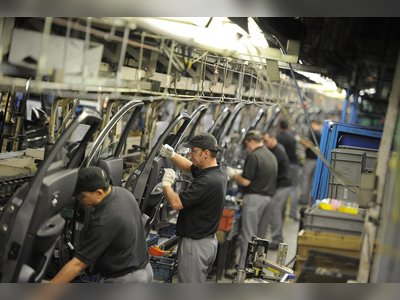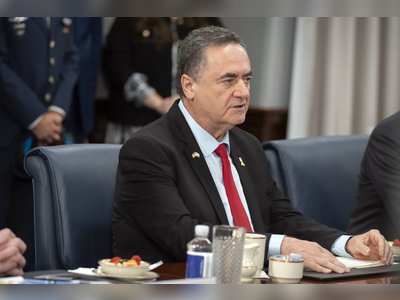Global Automaker Shares Plummet Following US Tariff Announcement
Donald Trump’s 25% tariff on car imports triggers declines in automaker stocks globally, prompting responses from UK officials and industry leaders.
Shares in automakers worldwide experienced a significant decline on Thursday, following the announcement of a 25% tariff on all car imports to the United States by President Donald Trump.
This new tariff is set to take effect on April 3, coinciding with Trump's plans to unveil reciprocal tariffs aimed at countries contributing to the US trade deficit.
In the wake of Trump's announcement, stocks of major US automakers fell sharply, with General Motors declining by 7.4% and Ford dropping by 3.4% in early trading.
The potential impact of these tariffs on the automotive industry has raised concerns among stakeholders across various markets.
When questioned about possible retaliatory tariffs from the UK, Chancellor Rachel Reeves stated that the UK government is not currently considering such measures.
She expressed the position that escalating trade wars would be detrimental for both the UK and the US and emphasized efforts to secure a beneficial trade deal for Britain in the coming days.
During remarks made in the Oval Office, Trump outlined the tariff structure, stating that it would increase from the current 2.5% baseline to 25%.
Automakers in the UK rely heavily on exports to the US, which amounted to £6.4 billion in 2023. Prominent British manufacturers like Aston Martin, Jaguar, and Land Rover are central to these exports.
Aston Martin’s stock was notably affected, suffering a 6.7% drop to reach a record low of 67p before closing at 68.7p.
The introduction of the new tariffs influenced European markets as well, particularly the automotive sector, with the DAX index in Germany lowering to a two-week low before recovering slightly, ultimately closing 0.7% down.
Major German manufacturers, such as Volkswagen, experienced stock losses—Volkswagen saw a decrease of 3.6% before closing at 1.3% down, given its substantial exposure to tariffs due to its supply chain operations.
Other European manufacturers also faced declines: Stellantis fell by 4.2%, Mercedes-Benz by 2.7%, and BMW by 2.6%.
In Asia, similar reactions occurred, with Toyota Motor shares declining by 2%, Honda by 2.5%, and Nissan by 1.7%, as the Nikkei index faced a 0.6% drop.
In South Korea, Hyundai Motor shares fell by 4.3%, despite the company's recent announcement of a $21 billion investment in the US aimed at appeasing Trump.
The Society of Motor Manufacturers and Traders in the UK has called for increased government support, reporting a continuous decline in vehicle production for twelve consecutive months alongside rising trade tensions and weak consumer demand.
Chief Executive Mike Hawes highlighted the critical situation facing UK automotive manufacturers and urged both the UK and US governmental bodies to collaborate towards a mutually beneficial agreement.
Reeves mentioned that the government may review an electric vehicle incentive scheme that has previously benefitted Tesla, a company notable for its reliance on surplus credits for struggling automakers in meeting electric vehicle sales targets.
As negotiations continue, Reeves indicated that the UK is exploring options to mitigate the impact of tariffs on British car manufacturers, including titans like Jaguar Land Rover, Rolls-Royce, and Aston Martin.
Keir Starmer, Leader of the Opposition, expressed concerns regarding the tariffs while attending a summit in Paris focused on Ukraine.
He emphasized the importance of seeking a negotiated resolution rather than engaging in a trade war, aligning with industry sentiments regarding the adverse effects of tariff escalations.
Trump’s tariff announcement has been met with condemnation from several quarters, including the European Union and Canadian officials.
EU Commission President Ursula von der Leyen warned of the negative implications for businesses and consumers alike, while Canada's Prime Minister Mark Carney labelled the tariffs a direct threat to Canadian workers.
Economists have highlighted that the new tariffs could escalate vehicle costs in the US, potentially exceeding several thousand dollars due to complex, integrated manufacturing processes across Canada, Mexico, and the United States.
German Economy Minister Robert Habeck has called for a robust European response, asserting the need for the EU to take action in light of the escalating trade situation.
This new tariff is set to take effect on April 3, coinciding with Trump's plans to unveil reciprocal tariffs aimed at countries contributing to the US trade deficit.
In the wake of Trump's announcement, stocks of major US automakers fell sharply, with General Motors declining by 7.4% and Ford dropping by 3.4% in early trading.
The potential impact of these tariffs on the automotive industry has raised concerns among stakeholders across various markets.
When questioned about possible retaliatory tariffs from the UK, Chancellor Rachel Reeves stated that the UK government is not currently considering such measures.
She expressed the position that escalating trade wars would be detrimental for both the UK and the US and emphasized efforts to secure a beneficial trade deal for Britain in the coming days.
During remarks made in the Oval Office, Trump outlined the tariff structure, stating that it would increase from the current 2.5% baseline to 25%.
Automakers in the UK rely heavily on exports to the US, which amounted to £6.4 billion in 2023. Prominent British manufacturers like Aston Martin, Jaguar, and Land Rover are central to these exports.
Aston Martin’s stock was notably affected, suffering a 6.7% drop to reach a record low of 67p before closing at 68.7p.
The introduction of the new tariffs influenced European markets as well, particularly the automotive sector, with the DAX index in Germany lowering to a two-week low before recovering slightly, ultimately closing 0.7% down.
Major German manufacturers, such as Volkswagen, experienced stock losses—Volkswagen saw a decrease of 3.6% before closing at 1.3% down, given its substantial exposure to tariffs due to its supply chain operations.
Other European manufacturers also faced declines: Stellantis fell by 4.2%, Mercedes-Benz by 2.7%, and BMW by 2.6%.
In Asia, similar reactions occurred, with Toyota Motor shares declining by 2%, Honda by 2.5%, and Nissan by 1.7%, as the Nikkei index faced a 0.6% drop.
In South Korea, Hyundai Motor shares fell by 4.3%, despite the company's recent announcement of a $21 billion investment in the US aimed at appeasing Trump.
The Society of Motor Manufacturers and Traders in the UK has called for increased government support, reporting a continuous decline in vehicle production for twelve consecutive months alongside rising trade tensions and weak consumer demand.
Chief Executive Mike Hawes highlighted the critical situation facing UK automotive manufacturers and urged both the UK and US governmental bodies to collaborate towards a mutually beneficial agreement.
Reeves mentioned that the government may review an electric vehicle incentive scheme that has previously benefitted Tesla, a company notable for its reliance on surplus credits for struggling automakers in meeting electric vehicle sales targets.
As negotiations continue, Reeves indicated that the UK is exploring options to mitigate the impact of tariffs on British car manufacturers, including titans like Jaguar Land Rover, Rolls-Royce, and Aston Martin.
Keir Starmer, Leader of the Opposition, expressed concerns regarding the tariffs while attending a summit in Paris focused on Ukraine.
He emphasized the importance of seeking a negotiated resolution rather than engaging in a trade war, aligning with industry sentiments regarding the adverse effects of tariff escalations.
Trump’s tariff announcement has been met with condemnation from several quarters, including the European Union and Canadian officials.
EU Commission President Ursula von der Leyen warned of the negative implications for businesses and consumers alike, while Canada's Prime Minister Mark Carney labelled the tariffs a direct threat to Canadian workers.
Economists have highlighted that the new tariffs could escalate vehicle costs in the US, potentially exceeding several thousand dollars due to complex, integrated manufacturing processes across Canada, Mexico, and the United States.
German Economy Minister Robert Habeck has called for a robust European response, asserting the need for the EU to take action in light of the escalating trade situation.










